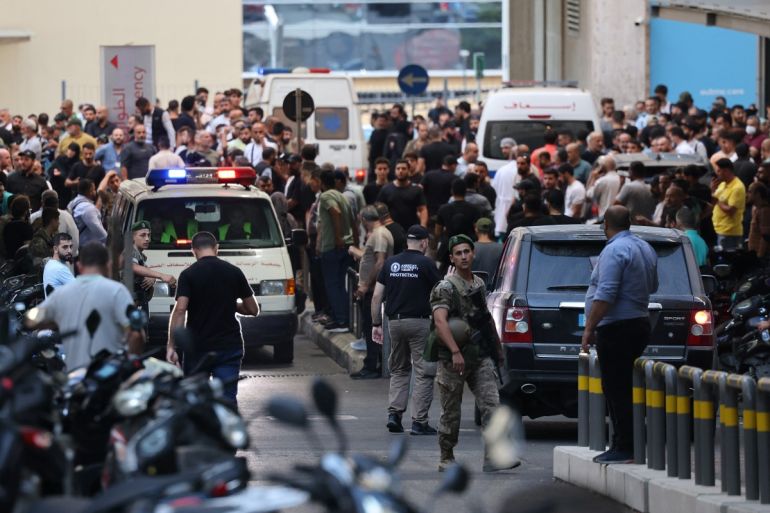Escalation fears spike as Hezbollah vows retaliation for pager attack
Regional leaders warn the assault is driving the Middle East to the brink of all-out war.
Ambulances are surrounded by people at the entrance of the American University of Beirut Medical Center after explosions hit locations in several Hezbollah strongholds, September 17 [Anwar Amro/AFP]Published On 18 Sep 202418 Sep 2024
Fears of escalation have spiked as Hezbollah promised retaliation against Israel which it blames for an attack in which pagers simultaneously exploded.
In a statement on Wednesday, the Lebanese armed group warned that Israel awaits “a difficult reckoning” for the coordinated attack on Tuesday, which killed 12 people and injured more than 2,800 in Lebanon and in parts of Syria.
The unprecedented cyberattack has revived fears that soaring tensions between Iran-backed Hezbollah and Israel could spiral into full-blown war.
The indiscriminate attack, which Israel has not commented upon but appears certain to have been conducted by Israeli security services, and the rhetoric emerging from Tehran also raises once more concerns that Israel’s war on Gaza threatens to prompt a regional conflagration.
Those worries have seen numerous global and regional states condemn the attack in Lebanon and call for calm, as Hezbollah said in a statement that it holds Israel “fully responsible” and that it will seek revenge.
Hassan Nasrallah, leader of the Iran-backed group which has also stressed that the attack will only increase its determination to press on with its operations against Israel to support Gaza, is due to deliver an address on Thursday.
The Foreign Ministry in Iran, whose own ambassador was injured in the attack, accused Israel of “mass murder”.
President Masoud Pezeshkian pointed his finger at Israel’s allies in the West.
“The incident once again showed that western nations and Americans fully support crime, killings and blind assassinations by the Zionist regime,” a statement on his website read.
In Egypt to discuss the latest efforts to reach a ceasefire deal for Gaza, US Secretary of State Antony Blinken denied that Washington had prior knowledge of the attack and stressed the need to “avoid taking steps that could further escalate conflict”.
Alongside him, Egypt’s President Abdel Fattah el-Sisi said that the attack would only see his country accelerate its efforts to secure a ceasefire in the Palestinian enclave.
Growing risk
The growing risk of escalation drew condemnation and calls for calm on Wednesday.
Jordan’s foreign minister warned that Israel is pushing the Middle East to the brink of regional war.
“I can only condemn these attacks that endanger the security and stability of Lebanon, and increase the risk of escalation in the region,” the European Union’s foreign affairs chief Josep Borrell said.
A spokeswoman for the Russian Foreign Ministry said: “It appears that the organisers of this high-tech attack deliberately sought to foment a large-scale armed confrontation in order to provoke a major war in the Middle East.”
Throughout the almost yearlong Gaza war, Hezbollah has engaged in a parallel conflict with Israel along its northern border, with the pair trading near-daily fire.
The exchanges have killed hundreds of mostly fighters in Lebanon, and dozens including soldiers in Israel, while forcing tens of thousands of people on both sides of the border to flee their homes.
Meanwhile, Israel has also carried out numerous presumed assassinations on Lebanese soil, including killing the group’s top commander Fuad Shukr.
Hours before its latest coordinated attack on Hezbollah, Israel announced it was broadening the aims of the Gaza war to include its fight against the group along its border.
Samuel Ramani, an associate fellow at the Royal United Services Institute, told Al Jazeera that Israel may be sensing “a historic capability to decapitate [the group’s] capabilities as the war in Gaza winds down”.
“The jury is still out on what they really want, but I think the prospect that Israel wants escalation is higher now than it was earlier,” he said.
Concern has also been bubbling regarding the threat of an open conflict between Israel and Iran.
The two have swapped limited air raids in recent months, while Tehran is yet to react to the assassination of Hamas leader Ismail Haniyeh in the Iranian capital in July.
‘Increase our resolve’
Despite suffering a heavy security blow, Hezbollah says it will not back down in its defence of the Palestinian cause.
“What happened yesterday will increase our determination and resolve”, the group said.
The Lebanese government meanwhile gave indications that it is bracing for higher-intensity conflict.
Speaking to the press on Wednesday, Lebanon’s Health Minister Firass Abiad said “we have to be ready and alert” and spoke of the need to stockpile medicine and fuel.
The attack shows Israel is “steering away from a diplomatic solution,” Abiad said.
